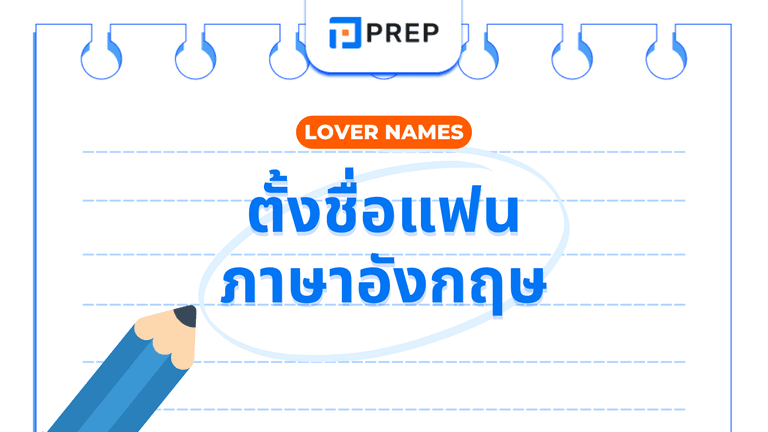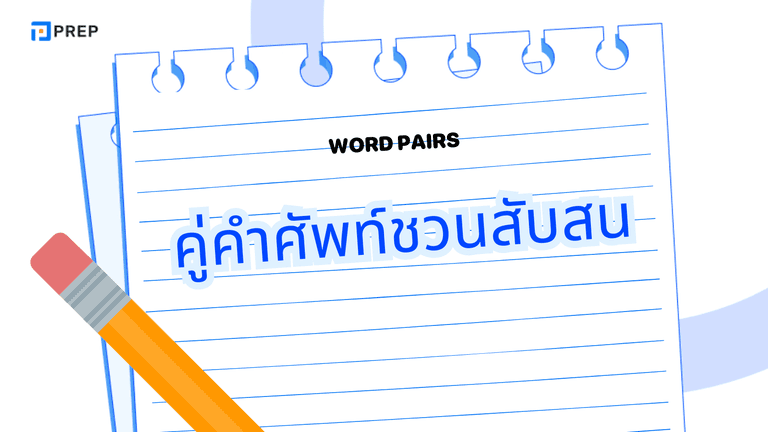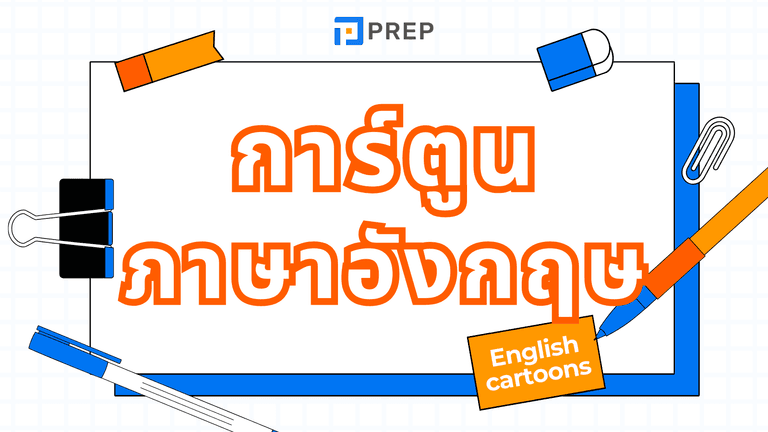Reported Speech คืออะไร ใช้ยังไงให้ถูกต้อง
Reported speech คือ รูปแบบประโยคที่ใช้ในการรายงานหรือถ่ายทอดคำพูดของผู้อื่นโดยไม่ต้องใช้เครื่องหมาย quotation marks การเข้าใจ reported speech คือ ทักษะสำคัญที่จะช่วยให้คุณสามารถสื่อสารภาษาอังกฤษได้อย่างถูกต้องและเป็นธรรมชาติ โดยเฉพาะในการสอบมาตรฐานต่างๆ เช่น IELTS
บทความนี้จะพาคุณไปเรียนรู้ reported speech แบบเข้าใจง่าย ไม่ต้องท่องจำกฎเกณฑ์มากมาย ผ่าน reported speech ตัวอย่างประโยค หลากหลายรูปแบบ ทั้งประโยคบอกเล่า ประโยคคำถาม และประโยคคำสั่ง เราจะอธิบายหลักการเปลี่ยนแปลงสำคัญเพียง 3 ประการ พร้อม reported speech examples ที่ใช้ได้จริงในชีวิตประจำวัน
มาเริ่มทำความเข้าใจพื้นฐานของ reported speech กันเลย และคุณจะพบว่าการเรียนรู้ไวยากรณ์อังกฤษส่วนนี้ไม่ได้ยากอย่างที่คิด!
- I. Reported Speech คืออะไร?
- II. โครงสร้างพื้นฐานของ Reported Speech
- III. กฎการเปลี่ยนกาลในร Reported Speech
- IV. การเปลี่ยนคำอื่นๆ ใน Reported Speech
- V. Reported Speech สำหรับประโยคคำถาม
- VI. Reported Speech สำหรับประโยคคำสั่งและคำขอร้อง
- VII. การใช้งาน Reported Speech ในสถานการณ์ต่างๆ
- VIII. ข้อผิดพลาดที่พบบ่อย
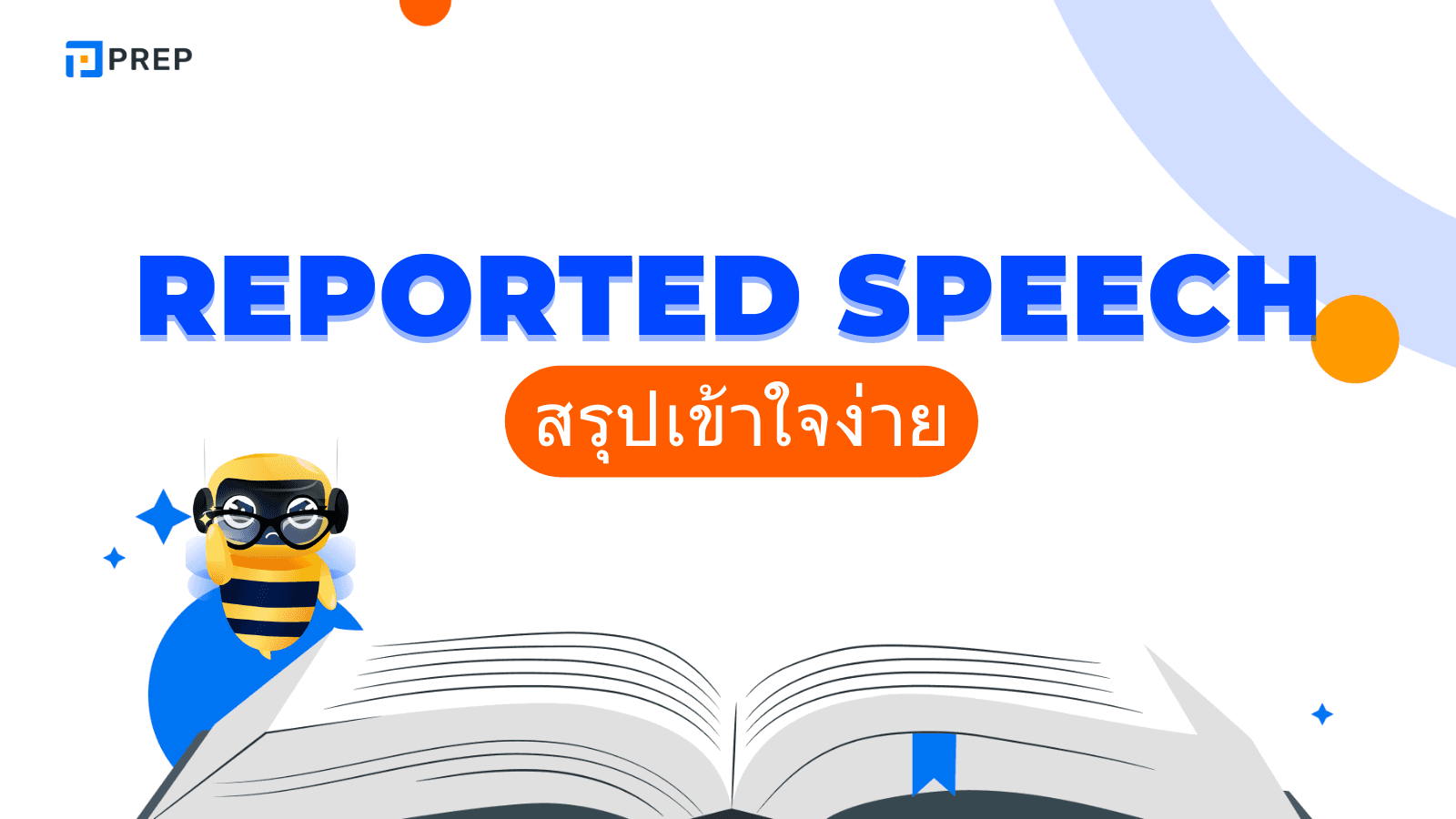
I. Reported Speech คืออะไร?
Reported speech คือ รูปแบบการถ่ายทอดคำพูดของผู้อื่นโดยการเปลี่ยนรูปแบบประโยคจากคำพูดตรง (Direct Speech) ให้เป็นประโยครายงาน (Reported Speech หรือ Indirect Speech) การเข้าใจว่า reported speech คือ อะไรจะช่วยให้คุณสามารถสื่อสารได้อย่างมีประสิทธิภาพมากขึ้น
ลักษณะสำคัญของ Reported Speech:
- ไม่ใช้เครื่องหมาย quotation marks (" ")
- เปลี่ยนสรรพนาม (Pronouns) ตามบริบท
- เปลี่ยนกาล (Tenses) ตามกฎการเปลี่ยนแปลง
- เปลี่ยนคำแสดงเวลาและสถานที่
- ใช้กริยานำ (Reporting Verbs) เช่น say, tell, ask
ความแตกต่างระหว่าง Direct Speech และ Reported Speech
|
ลักษณะ |
Direct Speech |
Reported Speech |
|
เครื่องหมาย |
ใช้ " " |
ไม่ใช้ " " |
|
กาล |
ตามคำพูดเดิม |
เปลี่ยนตามกฎ |
|
สรรพนาม |
ตามผู้พูดเดิม |
เปลี่ยนตามบริบท |
|
คำแสดงเวลา |
today, tomorrow, yesterday |
that day, the next day, the previous day |
|
ตัวอย่าง |
She said, I am tired. |
She said that she was tired. (เธอบอกว่าเธอเหนื่อย) |
II. โครงสร้างพื้นฐานของ Reported Speech
1. กริยานำที่ใช้บ่อย
Reported speech ใช้กริยานำหลายประเภทตามลักษณะของประโยค
|
กริยานำ |
การใช้งาน |
ตัวอย่าง |
|
Say |
รายงานคำพูดทั่วไป |
He said that he was busy. (เขาบอกว่าเขายุ่ง) |
|
Tell |
รายงานคำพูดพร้อมระบุผู้ฟัง |
She told me that she would come. (เธอบอกฉันว่าเธอจะมา) |
|
Ask |
รายงานคำถามหรือคำขอร้อง |
He asked if I was free. (เขาถามว่าฉันว่างไหม) |
|
Reply/Answer |
รายงานคำตอบ |
She replied that she didn't know. (เธอตอบว่าเธอไม่รู้) |
2. โครงสร้างพื้นฐาน
รูปแบบทั่วไปของ reported speech สรุป ได้ดังนี้:
Reporting Verb + that + Subject + Verb (เปลี่ยนกาล)
ตัวอย่าง:
-
Direct: John said, I am happy. (จอห์นพูดว่า ฉันมีความสุข)
-
Reported: John said that he was happy. (จอห์นบอกว่าเขามีความสุข)
ความแตกต่างระหว่าง Say และ Tell
|
Say |
Tell |
|
ไม่ต้องมีกรรม |
ต้องมีกรรม (บอกใคร) |
|
Say + (that) + clause |
Tell + object + (that) + clause |
|
She said she was tired. |
She told me she was tired. |
|
ไม่ใช้: say me |
ถูกต้อง: tell me |
III. กฎการเปลี่ยนกาลในร Reported Speech
1. ตารางการเปลี่ยนกาล
Reported speech หลักการ ใช้ ที่สำคัญคือการเปลี่ยนกาลตามกฎ
|
Direct Speech |
Reported Speech |
ตัวอย่าง |
|
Past Simple |
I work here. → He said he worked there. (เขาบอกว่าเขาทำงานที่นั่น) |
|
|
Past Continuous |
I am studying. → She said she was studying. (เธอบอกว่าเธอกำลังเรียน) |
|
|
Past Perfect |
I have finished. → He said he had finished. (เขาบอกว่าเขาทำเสร็จแล้ว) |
|
|
Past Perfect |
I went home. → She said she had gone home. (เธอบอกว่าเธอกลับบ้านแล้ว) |
|
|
Will |
Would |
I will call you. → He said he would call me. (เขาบอกว่าเขาจะโทรหาฉัน) |
|
Can |
Could |
I can swim. → She said she could swim. (เธอบอกว่าเธอว่ายน้ำเป็น) |
|
May |
Might |
I may come. → He said he might come. (เขาบอกว่าเขาอาจจะมา) |
|
Must |
Had to/Must |
I must go. → She said she had to go. (เธอบอกว่าเธอต้องไป) |
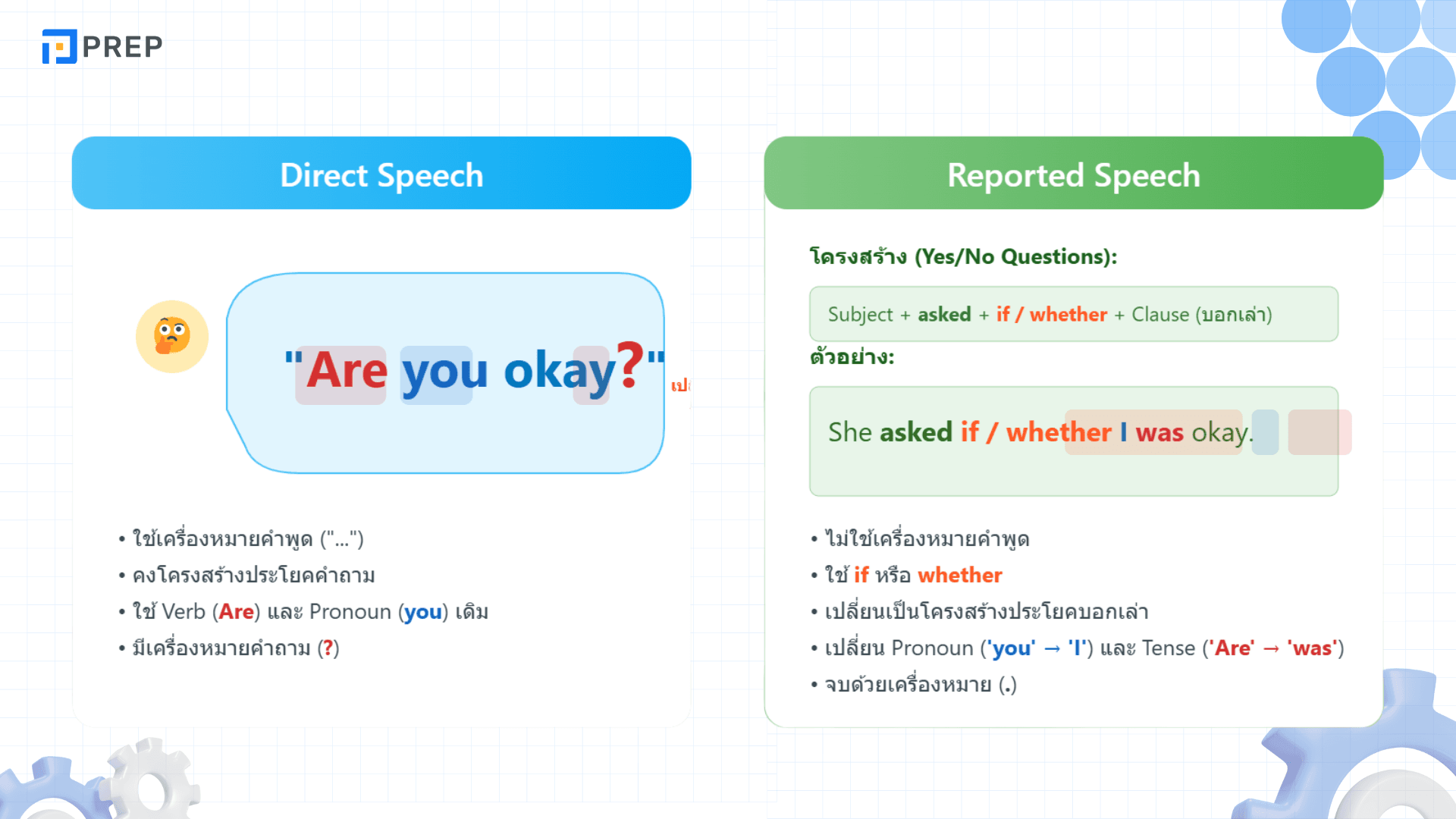
2. กรณีที่ไม่ต้องเปลี่ยนกาล
Reported speech คือ การรายงานที่บางครั้งไม่ต้องเปลี่ยนกาลในกรณีต่อไปนี้:
กรณีพิเศษ:
-
ความจริงทั่วไป: He said the Earth revolves around the Sun. (เขาบอกว่าโลกหมุนรอบดวงอาทิตย์)
-
เหตุการณ์ที่ยังเป็นจริง: She said she lives in Bangkok. (เธอบอกว่าเธออยู่กรุงเทพฯ)
-
กริยานำเป็น Present: He says he is tired. (เขาบอกว่าเขาเหนื่อย)
-
Past Perfect ยังคงเป็น Past Perfect: He said he had already eaten. (เขาบอกว่าเขากินแล้ว)
IV. การเปลี่ยนคำอื่นๆ ใน Reported Speech
1. การเปลี่ยนสรรพนาม
Reported speech ตัวอย่างประโยค แสดงการเปลี่ยนสรรพนาม
|
Direct Speech |
Reported Speech |
ความหมาย |
|
I, me, my, mine |
he/she, him/her, his/her, his/hers |
เปลี่ยนตามผู้พูด |
|
You, your, yours |
I/we, my/our, mine/ours |
เปลี่ยนตามผู้ฟัง |
|
We, us, our, ours |
they, them, their, theirs |
เปลี่ยนเป็นบุคคลที่สาม |
ตัวอย่าง:
-
Direct: She said, I love my job. (เธอพูดว่า ฉันรักงานของฉัน)
-
Reported: She said that she loved her job. (เธอบอกว่าเธอรักงานของเธอ)
2. การเปลี่ยนคำแสดงเวลาและสถานที่
|
Direct Speech |
Reported Speech |
ตัวอย่าง |
|
now |
then, at that time |
He said he was busy now. → He said he was busy then. (เขาบอกว่าเขายุ่งตอนนั้น) |
|
today |
that day |
She said, I'm leaving today. → She said she was leaving that day. (เธอบอกว่าเธอจะไปวันนั้น) |
|
tomorrow |
the next day, the following day |
He said, I will call tomorrow. → He said he would call the next day. (เขาบอกว่าเขาจะโทรวันรุ่งขึ้น) |
|
yesterday |
the day before, the previous day |
She said, I met him yesterday. → She said she had met him the day before. (เธอบอกว่าเธอเจอเขาวันก่อนหน้า) |
|
this week/month/year |
that week/month/year |
We said, We are busy this week. → We said we were busy that week. (เราบอกว่าเรายุ่งสัปดาห์นั้น) |
|
next week/month/year |
the following week/month/year |
He said, I will travel next month. → He said he would travel the following month. (เขาบอกว่าเขาจะเดินทางเดือนถัดไป) |
|
last week/month/year |
the previous week/month/year |
She said, I graduated last year. → She said she had graduated the previous year. (เธอบอกว่าเธอจบปีก่อนหน้า) |
|
here |
there |
They said, We live here. → They said they lived there. (พวกเขาบอกว่าพวกเขาอยู่ที่นั่น) |
|
this/these |
that/those |
He said, I like this book. → He said he liked that book. (เขาบอกว่าเขาชอบหนังสือเล่มนั้น) |
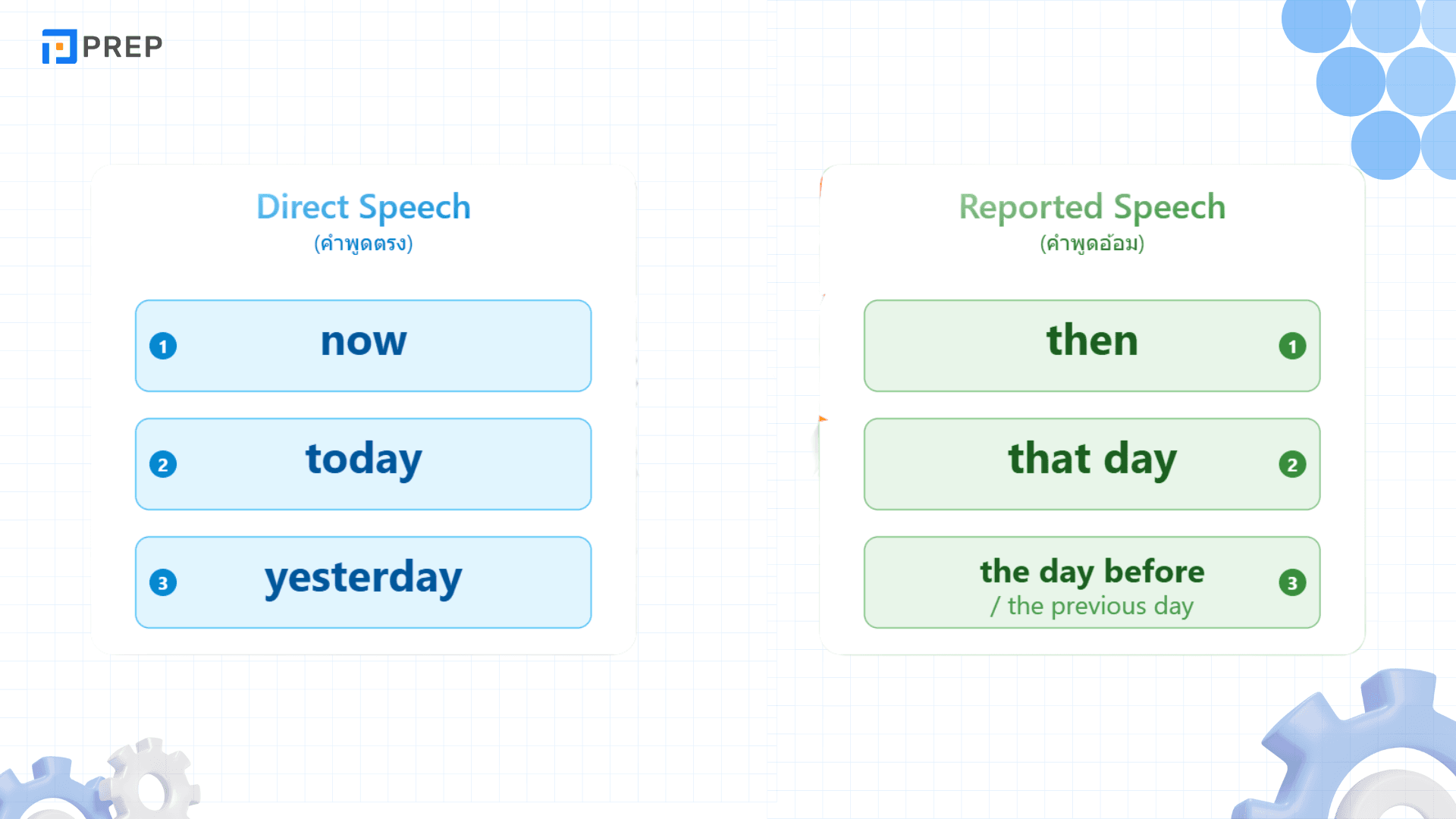
3. การเปลี่ยน Modal Verbs
|
Direct Speech |
Reported Speech |
ตัวอย่าง |
|
shall |
should/would |
I shall return. → He said he would return. (เขาบอกว่าเขาจะกลับมา) |
|
will |
would |
I will help you. → She said she would help me. (เธอบอกว่าเธอจะช่วยฉัน) |
|
can |
could |
I can speak English. → He said he could speak English. (เขาบอกว่าเขาพูดอังกฤษได้) |
|
may |
might |
I may be late. → She said she might be late. (เธอบอกว่าเธออาจมาสาย) |
Modal Verbs ที่ไม่เปลี่ยน:
-
would, could, might, should, ought to ยังคงเหมือนเดิม
V. Reported Speech สำหรับประโยคคำถาม
1. Yes/No Questions
Reported speech examples สำหรับ Yes/No Questions
โครงสร้าง: Ask + if/whether + Subject + Verb
|
Direct Question |
Reported Question |
|
Are you happy? |
He asked if I was happy. (เขาถามว่าฉันมีความสุขไหม) |
|
Do you like coffee? |
She asked whether I liked coffee. (เธอถามว่าฉันชอบกาแฟไหม) |
|
Have you finished? |
He asked if I had finished. (เขาถามว่าฉันทำเสร็จหรือยัง) |
|
Will you come? |
She asked whether I would come. (เธอถามว่าฉันจะมาไหม) |
2. Wh-Questions
โครงสร้าง: Ask + Wh-word + Subject + Verb
|
Direct Question |
Reported Question |
|
What is your name? |
He asked what my name was. (เขาถามว่าฉันชื่ออะไร) |
|
Where do you live? |
She asked where I lived. (เธอถามว่าฉันอยู่ที่ไหน) |
|
Why are you late? |
He asked why I was late. (เขาถามว่าทำไมฉันมาสาย) |
|
When will you arrive? |
She asked when I would arrive. (เธอถามว่าฉันจะมาถึงเมื่อไหร่) |
|
How do you do it? |
He asked how I did it. (เขาถามว่าฉันทำอย่างไร) |
VI. Reported Speech สำหรับประโยคคำสั่งและคำขอร้อง
1. Commands (คำสั่ง)
Reported speech คือ การรายงานคำสั่งโดยใช้โครงสร้าง: Tell/Order + Object + to + Verb
|
Direct Command |
Reported Command |
|
Close the door. |
He told me to close the door. (เขาสั่งให้ฉันปิดประตู) |
|
Don't be late. |
She told me not to be late. (เธอบอกให้ฉันอย่ามาสาย) |
|
Sit down. |
The teacher told us to sit down. (ครูบอกให้เรานั่งลง) |
|
Don't touch that. |
He ordered me not to touch that. (เขาสั่งให้ฉันอย่าแตะสิ่งนั้น) |
บทความแนะนำอ่านเพิ่มเติม: ประโยคคำสั่ง ภาษาอังกฤษ ใช้ยังไงให้ถูกและชัดเจน
2. Requests (คำขอร้อง)
โครงสร้าง: Ask + Object + to + Verb
|
Direct Request |
Reported Request |
|
Please help me. |
She asked me to help her. (เธอขอให้ฉันช่วยเธอ) |
|
Could you open the window? |
He asked me to open the window. (เขาขอให้ฉันเปิดหน้าต่าง) |
|
Would you mind waiting? |
She asked me to wait. (เธอขอให้ฉันรอ) |
3. Suggestions (คำแนะนำ)
กริยานำที่ใช้: suggest, propose, recommend
|
Direct Suggestion |
Reported Suggestion |
|
Let's go to the cinema. |
He suggested going to the cinema. (เขาแนะนำให้ไปดูหนัง) |
|
Why don't we take a break? |
She suggested that we take a break. (เธอแนะนำให้เราพักผ่อน) |
|
Shall we start now? |
He suggested starting then. (เขาแนะนำให้เริ่มตอนนั้น) |
บทความแนะนำอ่านเพิ่มเติม: ให้คำแนะนำเป็นภาษาอังกฤษแบบมืออาชีพ
VII. การใช้งาน Reported Speech ในสถานการณ์ต่างๆ
1. การใช้ในการเขียน
Reported speech คือ ทักษะสำคัญในการเขียนรายงานและบทความ
ในการเขียนรายงาน:
-
The CEO announced that the company would expand overseas. (CEO ประกาศว่าบริษัทจะขยายไปต่างประเทศ)
-
The researcher stated that the results were significant. (นักวิจัยระบุว่าผลลัพธ์มีนัยสำคัญ)
-
The minister confirmed that new policies would be implemented. (รัฐมนตรียืนยันว่านโยบายใหม่จะถูกนำมาใช้)
ในการเขียนข่าว:
-
The witness reported that he had seen the accident. (พยานรายงานว่าเขาเห็นอุบัติเหตุ)
-
Officials said that the situation was under control. (เจ้าหน้าที่กล่าวว่าสถานการณ์อยู่ในความควบคุม)
2. การใช้ในการพูด
การสนทนาประจำวัน:
-
My mom told me to clean my room. (แม่บอกให้ฉันทำความสะอาดห้อง)
-
He said he would call me later. (เขาบอกว่าเขาจะโทรหาฉันทีหลัง)
-
She asked if I wanted to join them. (เธอถามว่าฉันอยากไปกับพวกเขาไหม)
การถ่ายทอดข้อมูล:
-
The teacher explained that we needed to submit the assignment by Friday. (ครูอธิบายว่าเราต้องส่งการบ้านภายในวันศุกร์)
-
The doctor advised me to get more rest. (หมอแนะนำให้ฉันพักผ่อนมากขึ้น)
3. การใช้ในการสอบ IELTS
Reported speech คือ ทักษะที่ใช้บ่อยในการสอบ IELTS
ใน Speaking Part 3:
-
The interviewer asked what I thought about modern technology. (ผู้สัมภาษณ์ถามว่าฉันคิดอย่างไรเกี่ยวกับเทคโนโลยีสมัยใหม่)
-
I explained that technology had changed our lives significantly. (ฉันอธิบายว่าเทคโนโลยีเปลี่ยนแปลงชีวิตเราอย่างมาก)
ใน Writing Task 1 (Graph description):
-
The data shows that sales increased dramatically. (ข้อมูลแสดงว่ายอดขายเพิ่มขึ้นอย่างมาก)
-
The report indicates that consumption patterns have changed. (รายงานระบุว่ารูปแบบการบริโภคเปลี่ยนแปลงไป)
บทความแนะนำอ่านเพิ่มเติม:
ไขทุกข้อสงสัย Part of Speech พื้นฐานแกรมมาร์ที่ทุกคนต้องรู้
ไขทุกข้อสงสัย Direct Indirect Speech หลักการเล่าคำพูด
VIII. ข้อผิดพลาดที่พบบ่อย
1. การลืมเปลี่ยนกาล
|
ผิด |
ถูก |
|
He said he is tired. |
He said he was tired. (เขาบอกว่าเขาเหนื่อย) |
|
She told me she will come. |
She told me she would come. (เธอบอกฉันว่าเธอจะมา) |
|
They said they have finished. |
They said they had finished. (พวกเขาบอกว่าพวกเขาทำเสร็จแล้ว) |
2. การใช้ Say และ Tell ผิด
|
ผิด |
ถูก |
|
He said me the truth. |
He told me the truth. (เขาบอกความจริงกับฉัน) |
|
She told that she was happy. |
She said that she was happy. (เธอบอกว่าเธอมีความสุข) |
|
He said to me to wait. |
He told me to wait. (เขาบอกให้ฉันรอ) |
3. การลืมเปลี่ยนคำแสดงเวลา
|
ผิด |
ถูก |
|
He said he would come tomorrow. |
He said he would come the next day. (เขาบอกว่าเขาจะมาวันรุ่งขึ้น) |
|
She said she was here yesterday. |
She said she had been there the day before. (เธอบอกว่าเธออยู่ที่นั่นวันก่อนหน้า) |
4. การใช้ If/Whether กับคำถาม
|
ผิด |
ถูก |
|
He asked do I like coffee. |
He asked if I liked coffee. (เขาถามว่าฉันชอบกาแฟไหม) |
|
She asked me am I ready. |
She asked me if I was ready. (เธอถามฉันว่าฉันพร้อมหรือยัง) |
การเรียนรู้ reported speech คือ การพัฒนาทักษะสำคัญที่จะช่วยยกระดับความสามารถภาษาอังกฤษของคุณ การเข้าใจโครงสร้าง กฎการเปลี่ยนแปลง และการฝึกฝนอย่างสม่ำเสมอจะทำให้คุณสามารถใช้ reported speech ได้อย่างถูกต้องและมั่นใจ ไม่ว่าจะเป็นในการสนทนา การเขียน หรือการสอบภาษาอังกฤษ อย่าลืมว่าการเรียนรู้ภาษาต้องใช้เวลาและความอดทน แต่ด้วยความเข้าใจที่ถูกต้องและการฝึกฝนที่ต่อเนื่อง คุณจะสามารถเชี่ยวชาญ reported speech คือ อะไรและใช้งานได้อย่างเป็นธรรมชาติในทุกสถานการณ์
PREP Education เป็นสถาบันชั้นนำที่มีความเชี่ยวชาญในการสอนไวยากรณ์ภาษาอังกฤษอย่างเป็นระบบ รวมถึงหัวข้อที่ซับซ้อนอย่าง Reported Speech หลักสูตร เรียน IELTS ออนไลน์ ของเราครอบคลุมทุกหัวข้อไวยากรณ์ที่จำเป็นสำหรับการสอบ IELTS โดยอธิบายด้วยวิธีที่เข้าใจง่ายและมีตัวอย่างมากมาย ด้วยเทคโนโลยี AI ที่ทันสมัยและผู้สอนมืออาชีพ เราช่วยวิเคราะห์จุดอ่อนของผู้เรียนในการใช้โครงสร้างไวยากรณ์และให้คำแนะนำเฉพาะเจาะจง ระบบการเรียนออนไลน์ที่ยืดหยุ่นช่วยให้ผู้เรียนสามารถศึกษาไวยากรณ์และฝึกทักษะต่างๆ ได้ทุกที่ทุกเวลา PREP มุ่งมั่นช่วยให้นักเรียนทุกคนเข้าใจไวยากรณ์อย่างลึกซึ้งและสามารถนำไปใช้ได้อย่างถูกต้องในการสอบ IELTS ด้วยประสบการณ์และหลักสูตรที่ได้รับการพัฒนาอย่างต่อเนื่อง เราพร้อมเป็นพาร์ทเนอร์ในการเรียนรู้ภาษาอังกฤษและการเตรียมสอบ IELTS ของคุณ

สวัสดีค่ะ ฉันชื่อมุก ปัจจุบันดูแลด้านเนื้อหาผลิตภัณฑ์ของ Prep Education ค่ะ
ด้วยประสบการณ์มากกว่า 5 ปีในการเรียน IELTS ออนไลน์ด้วยตนเอง ฉันเข้าใจดีถึงความท้าทายที่ผู้เรียนต้องเผชิญ แล้วก็รู้ว่าอะไรที่มันเวิร์ก
มุกอยากเอาประสบการณ์ตรงนี้มาช่วยแชร์ แล้วก็ซัพพอร์ตเพื่อน ๆ ให้ได้คะแนนที่ดีที่สุดค่ะ
ความคิดเห็น
เนื้อหาแบบพรีเมียม
ดูทั้งหมดบทความที่เกี่ยวข้อง
แผนการเรียนรู้ส่วนบุคคล
อ่านมากที่สุด
ติดต่อ Prep ผ่านโซเชียล





